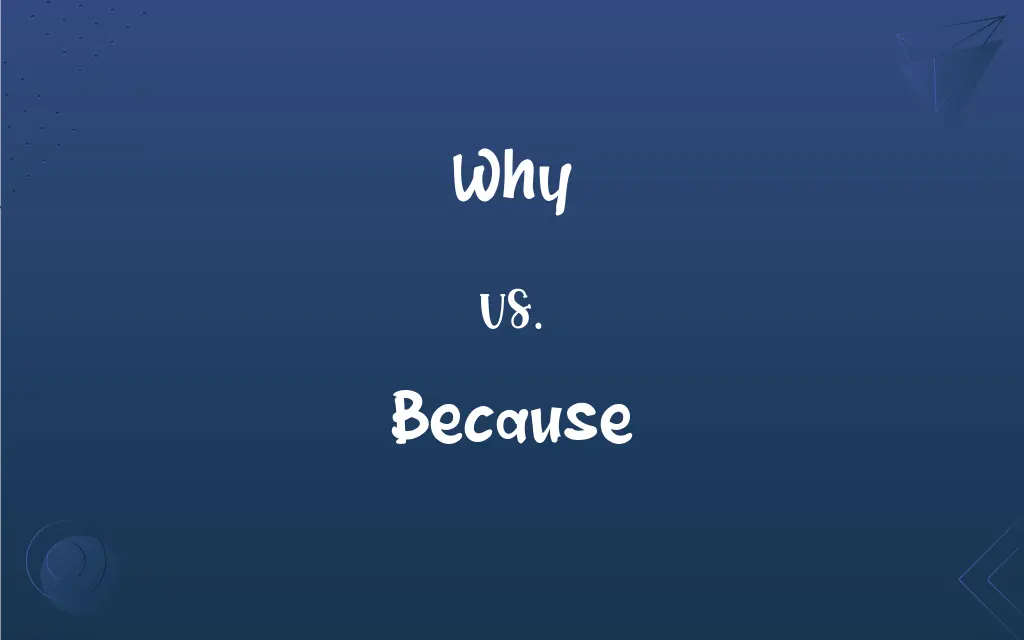Why vs. Because: What's the Difference?
Edited by Aimie Carlson || By Janet White || Published on December 18, 2023
"Why" is used to ask for reasons or explanations, whereas "because" is used to provide those reasons or explanations.

Key Differences
"Why" initiates a question seeking understanding or clarification, probing into the cause or reason behind an action or situation. "Because" is used in responses to convey the reason or rationale for something that has been questioned or stated.
In communication, "why" often expresses curiosity or a need for justification, prompting an explanatory response. "Because" serves as a bridge in conversation, linking an inquiry with its corresponding explanation or justification.
"Why" is typically used at the beginning of interrogative sentences, signaling a question. "Because" generally appears in the middle of declarative sentences, providing a cause or a basis for a statement.
In terms of grammar, "why" is an adverb or a conjunction introducing a question. "Because" functions as a conjunction connecting clauses, indicating a cause-and-effect relationship.
"Why" can also express a challenge or objection, seeking the rationale behind a decision or opinion. "Because" is used to affirm or defend a position, offering reasoning that supports a preceding statement or action.
ADVERTISEMENT
Comparison Chart
Grammatical Role
Used to ask questions.
Used to answer questions or provide reasons.
Sentence Position
Often at the beginning of a sentence.
Typically in the middle or second part of a sentence.
Purpose
Seeks explanations, reasons, or clarification.
Provides explanations, reasons, or clarification.
Type
Interrogative adverb or conjunction.
Causal conjunction.
Usage in Dialogue
Signals curiosity or challenge.
Signals response or justification.
ADVERTISEMENT
Why and Because Definitions
Why
Expresses inquiry or seeks explanation.
Why is the sky blue?
Because
Provides reasoning for a decision or opinion.
We must act now because time is of the essence.
Why
Used to ask about the reason or purpose behind something.
Why did you choose this career?
Because
Provides a reason or explanation.
I am happy because it's sunny.
Why
Indicates a request for justification.
Why should we follow these rules?
Because
Indicates causality in a statement.
The game was postponed because of rain.
Why
Used to question the cause of an event or action.
Why does the moon change its shape?
Because
Used to justify or defend a position or action.
I chose this path because it aligns with my values.
Why
Expresses surprise or disbelief.
Why, I never thought he would win!
Because
Connects two clauses, showing cause and effect.
He left early because he felt unwell.
Why
For what purpose, reason, or cause; with what intention, justification, or motive
Why is the door shut? Why do birds sing?.
Because
For the reason that; since.
Why
The reason, cause, or purpose for which
I know why you left.
Because
(archaic) For the reason that.
FAQs
What type of word is "why"?
It's an adverb or conjunction used for asking questions.
How is "because" used in sentences?
As a conjunction to provide reasons or explanations.
Does "because" always indicate a direct cause?
Generally, yes, it implies causality.
Can "why" start a declarative sentence?
Rarely, as it's primarily used in interrogative sentences.
Can "why" be used in indirect questions?
Yes, such as "I wonder why he left early."
Can "why" be used in rhetorical questions?
Yes, it's often used rhetorically to make a point.
Is "because" only used in formal language?
No, it's common in both formal and informal language.
Can "why" have different meanings?
It can imply different levels of inquiry or surprise.
Can "because" be replaced with "since" or "as"?
Sometimes, though these can have slightly different connotations.
Is "because" appropriate in academic writing?
Yes, it's suitable for providing explanations and reasons.
Is "because" used in complex sentences?
Yes, often to connect independent and dependent clauses.
Can "why" imply frustration or impatience?
Yes, depending on the tone and context.
Can "why" introduce a clause?
Yes, particularly in indirect questions.
How does "why" interact with tone in speech?
Tone can greatly change the implication of "why."
Is "why" used in informal speech?
Yes, it's widely used in both formal and informal contexts.
Does "because" always require a complete clause after it?
Typically, though in informal speech, it may stand alone.
Can "because" be used to evade a direct answer?
Sometimes, as in "I did it just because."
Can "because" begin a sentence?
Yes, though less common, as in "Because of the rain, we stayed home."
How is "why" used in argumentative texts?
To challenge or question a point of view.
Is "because" ever informal or colloquial?
Yes, especially in phrases like "just because."
About Author
Written by
Janet WhiteJanet White has been an esteemed writer and blogger for Difference Wiki. Holding a Master's degree in Science and Medical Journalism from the prestigious Boston University, she has consistently demonstrated her expertise and passion for her field. When she's not immersed in her work, Janet relishes her time exercising, delving into a good book, and cherishing moments with friends and family.
Edited by
Aimie CarlsonAimie Carlson, holding a master's degree in English literature, is a fervent English language enthusiast. She lends her writing talents to Difference Wiki, a prominent website that specializes in comparisons, offering readers insightful analyses that both captivate and inform.





































































